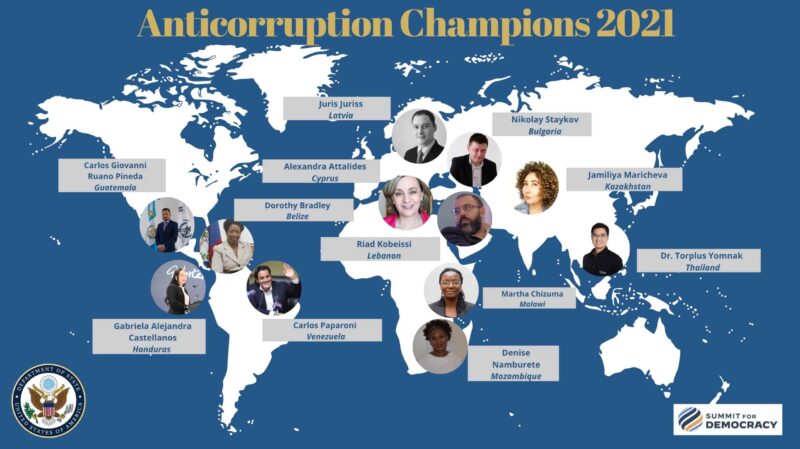Internews interviewed Kazakhstani journalist Jamilya Maricheva after she received the 2021 Anticorruption Champion award from the US State Department
Last week, U.S. Secretary of State Antony Blinken tweeted about the Anticorruption Champions 2021 international award. The U.S. State Department recognized 15 projects from around the world, including a project by Kazakhstani journalist Jamilya Maricheva called PROTENGE. We asked Jamilya, as well as Internews content production expert Marina Mikhtayeva, about the significance of this award.

The Anticorruption Champions International Award is given by the U.S. State Department to people who work with persistence to combat corruption and protect transparency and accountability in their countries. Often, they have to face adversity and hardships in their work. This year, 15 people from around the world received the award, which is awarded on December 9 – International Anti-Corruption Day.
Internews: Jamilya, did you apply for the award yourself, or were you nominated?
Jamilya: They contacted me six months ago, in May or June, asking for a meeting at Zoom. At the meeting, they asked questions about my project, and later they told me about this contest and asked if I would allow me to apply there. I wasn’t counting on anything, I thought it was cool to be even just a nominee, so I agreed. A few days before the post on Twitter, I was contacted by the embassy and told that I had become an Anticorruption Champion, and then the official confirmation came.
Internews: What does this award give you?
Jamilya: Our readers are also wondering about the money and bonuses. Actually, no, there is none of that. It’s very cool for me to get an outside review because the U.S. State Department and the U.S. Embassy in Kazakhstan are not organizations that we worked with or cooperated with during the project. They are third-party organizations. I don’t know who told the Embassy about us, but my understanding is that they read us. And as I understand it, it was their initiative. That said, I’m perfectly aware that there are dozens of cool people in Kazakhstan and journalists, and community activists, and activists who do a lot in this direction.
Internews: What do you think, for what case, for what achievement you received this title?
Jamilya: In my opinion, we got it not for any particular case, but rather for the fact that we were able to gather a large community of Kazakhstan citizens – probably the largest in Kazakhstan, 67,000 people – who care what their taxes are spent on. There is an illusion that the people of Kazakhstan are indifferent to this topic, but they are not. It’s just that no one had, let’s say, a heartfelt conversation with the people of Kazakhstan on this subject.
I don’t think we have any landmark cases. A landmark case is when, for example, in Moldova, they published an investigation about the president and it influenced the election results. Kazakhstan’s reality is that journalists, doing very big cool important things, get a decent assessment from a very small number of people. I think that in Kazakhstan there is no culture of talking about corruption. The task of our project is to make this part of our culture, so we speak up, and we discuss and talk. We have some cases for 175 million tenge and some cases for two million tenge. And what matters here is not the case itself, but the dialogue with the audience and the fact that we reflect on this topic. I believe that a year or two of such work – and abrupt investigations of journalists will be duly appreciated by our society.
Marina Mikhtayeva, Internews content production expert: The most important thing about this award is that only 15 projects from around the world have received it. And among them is Kazakhstan and Jamilya Maricheva. This shows what a great job she has done. This shows high competitiveness of the project. After all, PROTENGE is not a large media outlet, not the world-famous Bellingcat investigative project, but a micro-media, created by Jamilya almost single-handedly. Yes, now she has a small team. Meanwhile, it took only two years from the conception to receiving this award. We are very pleased that we are related to this project, that we supported Jamilya in its launch within Central Asia Media Program.
Of course, PROTENGE is a very important project for Kazakhstan. Before there were attempts to write about tenders, state budgets, but no one did it the way Jamilya did. What has she done, what’s so unique about her project? She didn’t create a website and wait for an audience to come to her, but she came with a serious topic to the place where the audience already existed – Instagram, the most popular social network among Kazakhstanis.
This social network had never been taken seriously before, but she managed to bring a serious topic there. And the audience accepted it, you can see it by the reach – in 2020 there were more than five million accounts, in 2021, also with the support of Internews, there are more than a million views. It raised a very important topic on Instagram to grow civic awareness.
The results confirm this: ridiculous tenders are being cancelled. For example, PROTENGE talked about how much the state spends on euthanizing stray animals when this money could have been used to build shelters. Her team signed a petition, passed it to the akimat [mayor’s office], now they are revising the program, developing a program of humane treatment of animals, which includes the construction of shelters instead of killing. Another confirmation is the awards. Earlier in Kazakhstan, she received the MISK organization award, and now she has received an international award. And finally, the fact that she has set the trend – more and more similar projects are appearing now, including on Instagram – all this is the evidence of her success.
The PROTENGE project was supported by the Central Asia Media Program (MediaCAMP), funded by USAID and implemented by Internews.
